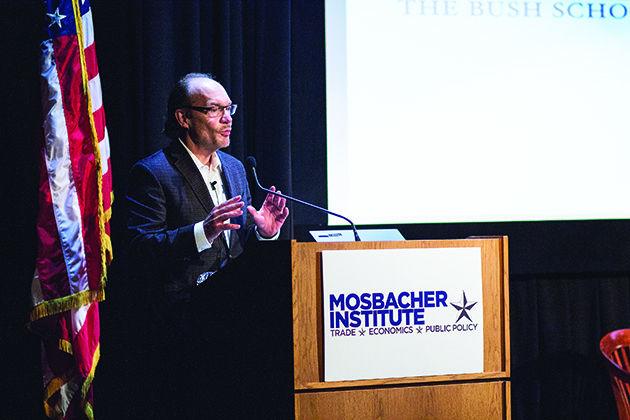Professors and students were given a look behind the scenes on how non-profit organizations function in international aid on Tuesday night.
The Mosbacher Institute hosted a discussion on global humanitarian crises led by Neal Keny-Guyer, CEO of Mercy Corps. Keny-Guyer has managed the organization since 1994 and oversees their annual disbursement of $375 million in aid.
“He brought Mercy Corps to be known in the international NGO world as the first to the worst with the most,” said Ryan Crocker, dean of the Bush School of Government and Public Service, who introduced Keny-Guyer.
Keny-Guyer lectured an audience of aid workers and students on effective means of international aid provided by non-profit organizations. Combining historical anecdotes and personal stories to identify solutions for global problems that are often irregular. His main message focused on a strategy of community-driven, market-led development that finds sustainable solutions.
“How do you not only alleviate immediate suffering… but do it in a way that they’re stronger when the next shock, the next crisis hits and they are better able with their own resilience, with their own internal fortitude, with their own strength to respond to those challenges?” Keny-Guyer said.
He said he challenged them not to try to find one big, fundamental answer to this question, but to take an individual approach to development.
“There has been an unprecedented confluence of complex crises that we have faced in the last 18 months,” Keny-Guyer said. “There are no fast fixes or shiny solutions to complex challenges.”
Crisis management, Keny-Guyer said, can be met with obstacles. Keny-Guyer identified bad governance and armed conflict as two issues to development in poor countries — problems well known to Mercy Corps, which operates in over 40 underdeveloped nations.
“By building relationships at a community level so that they have the capacity to then hold government accountable… we hope that over time that whole governance process will be strengthened and improved,” Keny-Guyer said.
Keny-Guyer said he hopes Mercy Corps’ strategies can be used in an increasingly unstable world.
The event was special to many in the audience not just for the discussion of international aid but also for an examination of leadership in organizations. Amira Khem, graduate student at the Bush School, said she appreciated Keny-Guyer’s comments on focusing on the bigger picture.
“For me it was how he deals with such a big organization,” Khem said. “His most important comment was about making sure you can look forward, that you can focus on the bigger picture, and make sure that everything running under you is coherent and successful as possible.”
The focus on leadership was something that was clear in both Keny-Guyer’s lecture and in his tenure at Mercy Corps.
“The most important ingredient in any organization is organizational culture,” Keny-Guyer said. “Is it a culture that we find deep meaning and purpose? I think if you get those ingredients right you’ll have a successful organization.”
Message to nonprofits: ‘No fast fixes or shiny solutions’
February 3, 2015
Alli Bradshaw — THE BATTALION
Neal Keny-Guyer, CEO of Mercy Corps, a non profit organization, extensively covered international aid and leadership during the event Tuesday.
0
Donate to The Battalion
$2065
$5000
Contributed
Our Goal
Your donation will support the student journalists of Texas A&M University - College Station. Your contribution will allow us to purchase equipment and cover our annual website hosting costs, in addition to paying freelance staffers for their work, travel costs for coverage and more!
More to Discover










